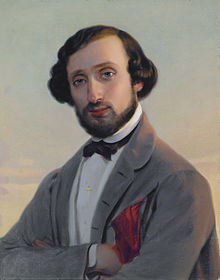Ludwig August von Frankl
- View a machine-translated version of the German article.
- Machine translation, like DeepL or Google Translate, is a useful starting point for translations, but translators must revise errors as necessary and confirm that the translation is accurate, rather than simply copy-pasting machine-translated text into the English Wikipedia.
- Consider adding a topic to this template: there are already 9,160 articles in the main category, and specifying
|topic=will aid in categorization. - Do not translate text that appears unreliable or low-quality. If possible, verify the text with references provided in the foreign-language article.
- You must provide copyright attribution in the edit summary accompanying your translation by providing an interlanguage link to the source of your translation. A model attribution edit summary is
Content in this edit is translated from the existing German Wikipedia article at [[:de:Ludwig August Frankl von Hochwart]]; see its history for attribution. - You may also add the template
{{Translated|de|Ludwig August Frankl von Hochwart}}to the talk page. - For more guidance, see Wikipedia:Translation.

Ludwig August Ritter von Frankl-Hochwart (3 February 1810 – 12 March 1894) was a Jewish Bohemian-Austrian writer and poet.
Biography
Frankl was born on 3 February 1810, in Chrast, Bohemia. His brothers were David Bernhard Frankl (1820-1859), merchant and founder of the Commercial Academy in Prague, and Wilhelm Frankl (1821-1893), imperial and municipal councilor who established the Vienna trade schools and the Vienna Central Cemetery.[1]
He was a friend of Nikolaus Lenau. He also corresponded with Petar II Petrovic Njegos of Montenegro before he died in 1851.
Frankl's Gusle, Serbische Nationallieder was dedicated to Vuk Karadžić's daughter in 1852. His object was to present some of the songs in Vuk which had not yet been translated,[clarification needed] and he took the greatest pains to reproduce in German the metrical effect of the Serbian original.[2]

He died on 12 March 1894, in Vienna.
Family
Ludwig August Frankl was married to Paula Wiener (born 1834), the daughter of Prague merchant and banker Hermann Wiener (died 1874) and his wife Therese von Lämel; their son was the neurologist Lothar von Frankl-Hochwart (1862-1914). A nephew of his was musicologist Paul Josef Frankl (1892-1976) who was professor at the Academy of Music in Vienna. He was a distant relative of Talmud scholar and rabbi Zecharias Frankel.[3]
References
- List of manuscripts At the Wiener Stadtbibliothek
- List of Works from Deutsche Dichterhandschriften des Poetischen Realismus at Brigham Young University
 This article incorporates text from a publication now in the public domain: Isidore Singer and S. Mannheimer (1901–1906). "Ludwig August Frankl, Ritter von Hochwart". In Singer, Isidore; et al. (eds.). The Jewish Encyclopedia. New York: Funk & Wagnalls.
This article incorporates text from a publication now in the public domain: Isidore Singer and S. Mannheimer (1901–1906). "Ludwig August Frankl, Ritter von Hochwart". In Singer, Isidore; et al. (eds.). The Jewish Encyclopedia. New York: Funk & Wagnalls.
External links

- Frankl-Hochwart, Ludwig August Ritter von at the aeiou Encyclopedia
- Digitized works by Ludwig August von Frankl at the Leo Baeck Institute, New York
- v
- t
- e












